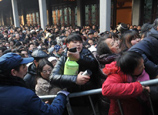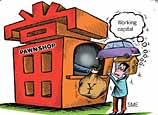
For many young people, shopping online has become a part of their lives. Mr. Liu was born in the 1980s. He spent nearly 30,000 yuan online last year. And he does think he has spent too much.
Mr. Liu, White Collar, said, "I work overtime very often. Shopping online is easy and I have many choices. I don’t spend too much compared with my female colleagues. They start their days with online shopping. "
Younger shoppers find themselves finanically restricted. Ms. Yin, born in 1992, spent only 4 thousand yuan last year. She says she envies those who have earned their own living.
Ms. Yin, Student, said, "I don’t think I’ve spent a lot. I’m still a student. I don’t have an income."
It’s generally thought that young people have contributed the most to online shopping revenues. However, Alipay has released a group of jaw-dropping figures, showing that those who were born before the 1960s have spent the most among all shoppers, with an average of more than 30 thousand yuan.
That’s over twice as much as those shoppers born in the 1980s. Alipay has found people in Hangzhou outspent people in other Chinese cities, with an average of nearly 40 thousand yuan.
Shopping is not the only purpose of many Alipay users. It also save many trouble when paying their bills.
"I pay all my bills online. Water, electricity and gas. Totalled over 1000 yuan."
"Yes, water, electricity, gas and telephone charges I pay all of them online."
It’s clear that shopping online has become the life style for many. Many who are lured by the low prices and endless choices have ended up spending much more than they had planned to. Taobao, China’s e-commerce giant, is expecting an even bigger year in 2013 than its 1 trillion yuan sales in 2012.


















![]()
